|
"Two Pint Wonder"
Reviewed by Natasha Lewin April 2013. The Tolucan Times
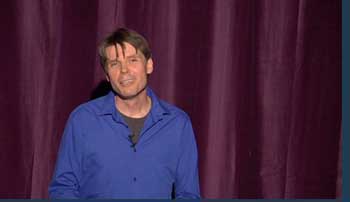 After a years-long stint away from the self-deprecating life of a stand-up comic, Owen Dara makes it back to the stage with a crowd-pleasing journey through his life in the solo comedy Two Pint Wonder. A clean comic with a dirty penchant for Irish stereotypes, Dara recalls his childhood on the Emerald Isle with fond memories of his alcoholic father, tough-as-nails mother, and suicidal tendencies as a teen. With unabashed honesty and a genuine ease behind the microphone, likeable Dara appears as if his material were more off the cuff than off the page. After a years-long stint away from the self-deprecating life of a stand-up comic, Owen Dara makes it back to the stage with a crowd-pleasing journey through his life in the solo comedy Two Pint Wonder. A clean comic with a dirty penchant for Irish stereotypes, Dara recalls his childhood on the Emerald Isle with fond memories of his alcoholic father, tough-as-nails mother, and suicidal tendencies as a teen. With unabashed honesty and a genuine ease behind the microphone, likeable Dara appears as if his material were more off the cuff than off the page.
But it’s not all one-liners and rimshots. As a longtime musician, Dara incorporates his love of music to deliver an array of well-timed jokes through the combination of audience participation and song. Strumming his acoustic guitar, Dara croons over ex-girlfriends and unrequited love, guiding the punchlined chorus with the help of the house.
The Irishman’s Jeff Foxworthy, Dara both roasts and toasts the two nations he calls home, showcasing the many hilarious and confusing differences he’s encountered since immigrating to America. From common misunderstandings to embarrassing admissions, Dara leaves no Blarney Stone unturned. Owen Dara effortlessly weaves the dichotomy of humor and strife into all his many colorful stories.
|
|
Two Pint Wonder.
Reviewed by Paul O’Sullivan, The Irish News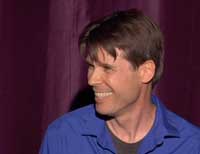
Upon witnessing a performance of Two Pint Wonder, the new show by comedian Owen Dara, it is no surprise to learn that the show’s writer and star is also an accomplished author and screenwriter. A native of Cork, Dara delivers a well-structured retelling of sections of his life from the challenges of his childhood to the particulars of becoming an immigrant in the US.
A seasoned performer whose tales effortlessly flow from one topic to the next, Dara proves through audience response, which ranges from hearty laughter to outright guffaws, that the experiences of a Corkman who has divided much of his life between Ireland and the US is not only relatable to others who have done the same, but also to many who were born and bred far from the Emerald Isle.
Equipped with a sharp wit, excellent timing, and an ability to build a strong rapport with his audience, Dara skillfully puts forth an array of well-crafted stories that are not only heavily smattered with punch lines, but completely devoid of the kind of smut upon which too many comedians have come to rely.
Owen Dara is a charismatic performer who in this mostly-autobiographical show skillfully weaves together his life experiences in a rich tapestry of crowd-pleasing hilarity. His likable nature immediately puts the audience at ease, and when it comes to commanding a response to his punch lines, this Two Pint Wonder never has to take no for an answer.
|
| |
"Two Pint Wonder"
Reviewed by Joy Shannon, OC Art Blog
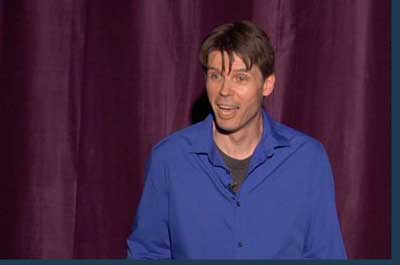 It’s rare that LA can offer me something that makes me feel right at home in Ireland again, but Owen Dara’s delightful comedy show “Two Pint Wonder” does just that. Dara crafted an extremely charming and, simply put, very funny show about the in and outs of growing up Irish and coming to America. For myself, as a child of immigrants from Ireland, Dara’s comedy possesses a particular type of self-deprecating Irish wit that feels almost nostalgic. Yet whether you’re Irish or American, this show’s irresistible levity will make you laugh out loud. Dara’s “Two Pint Wonder” reminded me why good live comedy, like good live music, is so engaging and elating to see. It’s rare that LA can offer me something that makes me feel right at home in Ireland again, but Owen Dara’s delightful comedy show “Two Pint Wonder” does just that. Dara crafted an extremely charming and, simply put, very funny show about the in and outs of growing up Irish and coming to America. For myself, as a child of immigrants from Ireland, Dara’s comedy possesses a particular type of self-deprecating Irish wit that feels almost nostalgic. Yet whether you’re Irish or American, this show’s irresistible levity will make you laugh out loud. Dara’s “Two Pint Wonder” reminded me why good live comedy, like good live music, is so engaging and elating to see.
Owen Dara is a multi-talented writer and performer who has delved in writing, acting, film, and music over the years. He penned White Horses: An Irish Childhood the book and one-man stage show, along with writing, directing and acting in 3-feature films. Meeting Dara was personally inspiring to me, as I saw a man who comes from a similar socioeconomic background as myself, who has consistently driven himself to pursue his creative goals. In our interview, he spoke of a poignant lesson he observed of his artist father during childhood: that “if you hide from your creativity it will seek you out… and drive you painfully into submission.” Dara is an intensely creative and prolific artist who has obviously submitted himself to the creative process body and soul.
SCROLL DOWN FOR FULL INTERVIEW
|
| Older Reviews for Comedy/Drama Solo Show. |
White Horses: An Irish Childhood
Reviewed by Sarah Congress, NYTheater.com
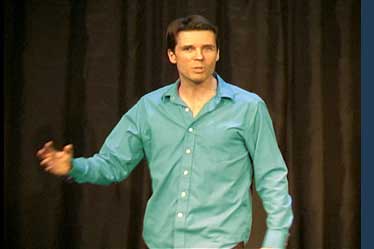 White Horses: An Irish Childhood tells the autobiographical coming-of-age story of writer/performer Owen Dara. Dara's childhood in Ireland did not involve famine, alcoholism, or even terrible poverty. Instead of death he battles his father's depression; in place of typhoid and tuberculosis, he conquers his soul's search for religion. Dara himself points out in the first few moments that if his story were that of a miserable and muddy Irish childhood, he would have titled it "Owen's Ashes." White Horses: An Irish Childhood tells the autobiographical coming-of-age story of writer/performer Owen Dara. Dara's childhood in Ireland did not involve famine, alcoholism, or even terrible poverty. Instead of death he battles his father's depression; in place of typhoid and tuberculosis, he conquers his soul's search for religion. Dara himself points out in the first few moments that if his story were that of a miserable and muddy Irish childhood, he would have titled it "Owen's Ashes."
With charisma and humor, Dara captivates the audience as he reenacts significant events from age five to adulthood. The audience watches Dara's raw yet often hilarious journey with school, girls, the controlling Catholic church, and a controlling Catholic mother. He successfully plays several different characters, making each one distinct using his physicality and vocal variety. His energy and good-nature flooded the theatre during his tales so much so that a few audience members actually began talking to him during the performance.
White Horses: An Irish Childhood is a moving and sincere play about a boy trying to understand his father's depression, his religion, and himself. Dara's magnetic energy and comedic timing help make his rather sad childhood into a funny, yet universal story about self realization.
Producer: Breaking Tide
Author: Owen Dara
Director: Dan Toscano & Elizabeth Duck
|
| |
"White Horses: An Irish Childhood"
Reviewed by Lauren Yarger, Buddyhollywood.com
Tassels Awarded: 4.5 of 5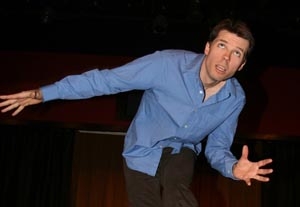
A sweet, sad and inspiring memoir of growing up in Ireland. Owen Dara uses humor, song and love to paint a picture of his boyhood in Cork, Ireland with a devout Catholic mother and a father who battles depression.
Dara is a wonderful storyteller, playing the various roles of his parents, a school mate, the priest and himself. He draws the audience in and touches them deeply with the tales. It's very encouraging to see an author's view of family dysfunction filtered by love, rather than by the anger and pain it causes. The show is derived from Dara's book of memoires "White Horses: An Irish Childhood." The white horses refer to a story his father told him about herds of white horses forming the white caps on ocean waves.
Highlights:
* Just the right blend of humor to balance the sadder parts
* The song he writes for his dad
Lowlights:
*None
|
Book Reviews
|
A Moving Memoir of Growing Up in Ireland
WHITE HORSES: An Irish Childhood
Breaking Tide ISBN: 1-4243-1403-8
Reviewed by Linda McKale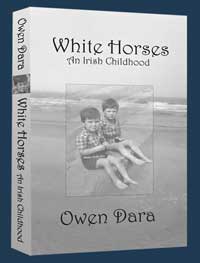 , The Celtic Connection , The Celtic Connection
With his use of inventive language and dialogue, Owen Dara has pieced together a moving memoir of his childhood growing up in a working class Irish household.
The book offers insight into how the various personalities coped with the challenges of illness, economic uncertainty, and discord. No writing about an Irish childhood would be complete without including the presence of the Catholic Church and its influence on the family.
Despite the hardships, Dara's narrative is filled with humour and an underlying sense of love and devotion within the family, especially in relation to the closeness between the author and his older brother.
The title of this book White Horses is taken from one of Dara's favourite childhood memory of his father and growing up by the ocean. It is interesting how he refers to the condition of his father's pottery wheel throughout the book and how this comes to symbolize what is happening within the family circle.
Having chosen to respect the privacy of his mother and siblings, this book is not available in Ireland. His mother voiced the opinion that she had no objection to the book's publication in Ireland, as long as she was either dead or in the advanced stages of Alzheimer's.
Owen Dara is a man of many talents: accomplished singer, musician and song writer. He is a graduate of the University of Melbourne, Australia, majoring in drama. As an actor of stage and screen, he has had many radio and television appearances and has also entertained on the international comedy circuit. He is currently residing in California.
|
A layered and deeply moving evocation of childhood that bristles with inventive language and dialogue. Dara recounts the travails of growing up in a working class Irish Catholic household with tenderness and a keenly observed sense of humor that linger long in the mind.
Jeremy Kay, Freelance Arts reviewer for The Guardian and The Daily Telegraph
|
White Horses draws on the same great tradition of depravation, linguistic riches, and Catholicism as Beckett, Flann O'Brien and Frank McCourt. It's updated, of course, but happily the world of growing up in Ireland appears to be as bleak and full of wonders and laughter as ever. Owen Dara nails it.
Jim Krusoe, author of Iceland and Girl Factory
|
| |
Q & A with Joy Shannon, OC Art Blog.
What was the original inspiration behind "Two Pint Wonder"? How long have you been preparing for it?
I have been working on the show on and off for a couple of years. The inspiration began with a desire to return to stand up comedy. I had been on a hiatus from stand up for a number of years, and even though my previous one-man show (based on my childhood) had some comedic elements, it also had its fair share of drama. Once that show had run its course, I really wanted to go back to making people laugh.
You are so multi-talented, what is your creative process like? How do you choose which medium (film, comedy, music) you are going to create with on any given day?
I generally have a single project at any given time that I make a priority. Initially it is inspiration that guides me to create within a particular medium–I’ll get a strong urge to write a song, or I’ll come up with an idea for a scene in a film or a bit for a show–and that is when the creative process is most exciting because I love working with fresh ideas. Once I have started, I will work nonstop on that one idea until I feel I have brought it to life to the best of my ability. That doesn’t mean that I will have finished with it; it just means that I will have reached a point where I cannot bring the idea any further along without first gaining perspective, which is usually my cue to begin working on an entirely different project. This “new” project may in fact be new, but more often than not it’s something that I had put aside some weeks or even months before in order that I might gain better perspective on that. I always do several drafts of everything I create, continually revisiting each project until I am sure that there is nothing more I can do to make it better. I find that the further along I get with a project, the more discipline I have to exercise through the process of bringing it to life. It’s as if inspiration initially brings me a gift in the form of an idea, guides me through the early shaping of that idea, and then sits back and demands that I work tirelessly in order to prove myself worthy of having received it.
If I have a deadline, I will continually push through a particular project, regardless of how much perspective I lack or what inspiration is telling me to do. As every artist knows, that is when the creative process is the most difficult.
This show is, in part, a comical look at about being an immigrant from Ireland in the US. Is there any cultural issue you’ve encountered that you did not include in the show… like anything that you couldn’t find humor in?
My experience as an immigrant has generally been very positive. People make fun of my accent sometimes, but I don’t take offense. While writing a comedy show, I try to find humor in all elements of my life, but of course that’s not always possible. That’s probably why I create through other mediums, too.
Why did you originally choose to move to the US?
 Coming to the US had been a dream of mine since my early teens. I first came when I was 20 years old and found some work as a car mechanic and house painter. It was my first time living away from home, and it was a wonderful adventure. Unfortunately, I had to leave after about 6 months because I had limited time on my visa. I tried to get a work permit, but was refused. Over a decade later, while living in Australia, I heard that the US government was holding a green card lottery, so I entered and got selected. I had great memories of the time I had spent in California, so moving here seemed like an obvious choice. I miss Ireland sometimes, and I would like to be closer to my family, but moving to the US is a decision I have never regretted. Coming to the US had been a dream of mine since my early teens. I first came when I was 20 years old and found some work as a car mechanic and house painter. It was my first time living away from home, and it was a wonderful adventure. Unfortunately, I had to leave after about 6 months because I had limited time on my visa. I tried to get a work permit, but was refused. Over a decade later, while living in Australia, I heard that the US government was holding a green card lottery, so I entered and got selected. I had great memories of the time I had spent in California, so moving here seemed like an obvious choice. I miss Ireland sometimes, and I would like to be closer to my family, but moving to the US is a decision I have never regretted.
Have you had any American or Irish people respond to the show in unexpected ways?
Whenever I do a new comedy show, I always find some unexpected reactions. I generally have a good sense of where the laughs should come, but when I perform it for the first time, I’m often surprised to find laughs in places I didn’t expect. Whenever I find places where the laughs are not as big as I expected, I either rework the material or drop it altogether. With any comedy show I do, I try to make it as accessible as possible to people from both sides of the Atlantic. There are always some stories and jokes that are more popular with one culture than another, and sometimes I can actually guess where someone is from by how they react to a particular joke compared to how they might react to another. An example of this was on opening night of Two Pint Wonder. There was an Irish couple in the front row of the theatre that I noticed would sometimes nod their heads in recognition as I told a story from my childhood, and at some points, they even started laughing during the set up of a joke, simply because their journey had been so similar to mine. The Irish and the American humor definitely have their differences, but there is also a lot of common ground, so when creating a show that I know is going to be attended by people from both sides of the Atlantic, I try to bridge the gap as much as I can.
 What inspired you when you were a kid to become an artist? Do you have any particular memory that shaped you or any particular role model that inspired you to seek a creative life? What inspired you when you were a kid to become an artist? Do you have any particular memory that shaped you or any particular role model that inspired you to seek a creative life?
My father was an artist. During my early childhood, he made his living as a potter and also spent a fair amount of time writing. I observed at a very early age the satisfaction he gained from creating a piece of pottery or writing a story, and I later observed how challenging his life became when, for financial reasons, he was forced to put his energies into a profession that worked against his artistic nature. He never stopped being an artist at his core and always maintained a keen ability to see beauty in the simplest things, like a piece of driftwood he would bring back from the seashore or an old stone he would pick up from the foot of a hill. The most important lesson I learned from him was that creativity is not about money or recognition, but about self-expression. If you are an artist, then you are an artist and that’s all there is to it. If you hide from your creativity, it will seek you out and punish you, and if you defy inspiration, it will turn its forces against you and drive you painfully into submission.
That’s the way it was with my father, and that’s the way it is with me. I’m very grateful to have had him in my life, and it is through having known him that I gained a better understanding of myself.
As an artist, do you feel more American or more Irish?
At this point, I would have to say Irish. Even though I now call America home and live an American life, my mind tends to drift across the ocean whenever I create. My book and my first one-man show are exclusively about my Irish childhood, and even though my current comedy show was inspired by a lot of my experiences in America, a portion of it covers parts of my childhood as well. Also each of the three feature films I have written and directed is set in Ireland. This was not a conscious choice in the beginning, but for some reason each of the stories I came up with seemed to work best in an Irish setting. A lot of people tend to revisit their childhood during times of creativity, and for me that just happens to be a different country.
When you set out to pursue a creative career, did you ever expect to be at this particular place and time (with this show, and having done all that you have done up to this point)?
There were always a lot of creative avenues that I wanted to pursue. From an early age, I had a desire to become a singer/songwriter and also dreamed of working in film. I had never imagined myself as a stand up comedian, but then when I started doing it, I fell in love with the process. After several years of doing it, I began to lose inspiration, so I directed my focus towards other creative endeavors. I always knew that I would go back to stand up again, but I didn’t know when. To be honest, it was a much longer hiatus than I expected, but I think the long break has turned out to be positive because it has given me perspective and provided me the opportunity to fall in love with the process all over again.
You’ve written a book, film, recorded a CD, produced this show… Where are you going next in your creative journey?
After I finish the current run of “Two Pint Wonder” I will have to devote my energies to the postproduction of my new film (“Thou Shalt Not Steal”). I will be doing a lot of the editing and scoring for the film and will also write and record some songs for the soundtrack. I’m hoping to also find time to write and perform, but I know that the film will take up most of my energy. After postproduction has been completed, I’m not sure what the next project will be. I have an idea for a TV pilot. Maybe I’ll work on that.
|
| |
Q&A with Owen Dara of White Horses: An Irish Childhood by Sarah B. Roberts
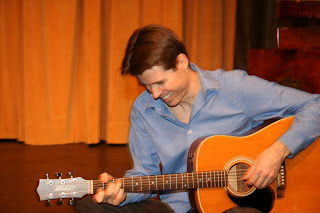 One FringeNYC custom is for members of shows to paper the line of people waiting in line for other shows. On Sunday, I was waiting on line, and had the opportunity to meet Owen Dara as he was handing out postcards for his show, White Horses: An Irish Childhood. I had the chance to visit with him about White Horses: One FringeNYC custom is for members of shows to paper the line of people waiting in line for other shows. On Sunday, I was waiting on line, and had the opportunity to meet Owen Dara as he was handing out postcards for his show, White Horses: An Irish Childhood. I had the chance to visit with him about White Horses:
What is your show about?
White Horses is about the struggle of growing up with parents who have conflicting views of how their children should be raised: Ma was a dedicated Catholic; Da never went to Mass. Her family was educated; his was working class. He loved to watch TV; she was convinced it was the primary tool of the devil. It's about a boy struggling to understand where he fits in, and how he is going to find his place in the world--a journey of constant searching and ultimate realization. It is also a comedic look at Irish society during an era that the Catholic church was unquestionably divine and family problems were rarely acknowledged or talked about outside the home. It's also about universal familial relationships.
This was originally your memoir? Is it published?
The memoir was published in 2007 by Breaking Tide, a company started by myself and Jessica Lancaster, which also produced "Choosing Signs" my recently shot feature film.
What inspired you to write it?
I was taking a writing class and was given an assignment by my teacher, Jim Krusoe. The assignment entailed creating a story using 5 particular nouns, which he wrote on the blackboard. I was feeling uninspired, so I just wrote something about my childhood in order to quickly fullfull the assignment before class. He handed it back to me the following week with the most positive feedback I had ever gotten from him up to that point. I was pleasantly surprised, and became inspired to write about other events of my childhood. Before long I had the first draft of my book.
Who are your collaborators and how long have you been working with them?
My main collabarators are Dan Toscano and Elizabeth Duck. They have been on board as directors since I finished the very first draft of my show. They are both wonderful people and extremely talented. Elizabeth helped me mostly with the character work. I remember during our first rehearsal, she got down on the floor and pretended to be a 4-year-old child playing in a sand pit. "Come on Owen, help me build a sand castle" she said with child-like enthusiasm. I joined her and we were both 4-year olds, who played in the sand for the rest of the afternoon. She also found appropriate activities for most of the other characters that I play in the show. Her commitment to character was enormously helpful to my process. Dan helped me mostly with structuring the script. He is an extremely funny person, who has a wonderful sense of what scenes should be cut and of which characters need more time on stage than others. Since my father was a potter, Dan also suggested that we build a pottery wheel (which he finished and decorated beautifully) for use on stage during some scenes where I play my father. Now I can't imagine the show without a pottery wheel. Each of my directors probably had an equal share in blocking the piece.
Any plans for another run somewhere?
I have no plans to run the show elsewhere for now. After FringeNYC, I will return to LA to continue post production on my feature film. As soon as that's done, I will definitely be open to doing a run of the show again.
Do you have duel citizenship with Ireland?
I am a citizen of Ireland (born and raised), Australia (spent most of my 20's there), and USA (been here for 10 years).
Guinness or Harps?
Actually I prefer Murphys, the local brew of my native Cork.
|
|